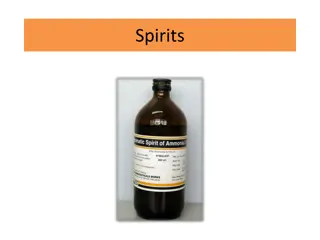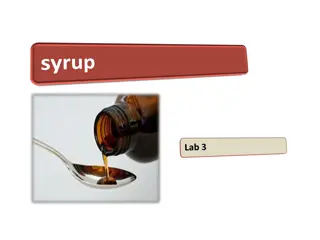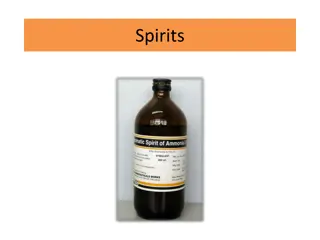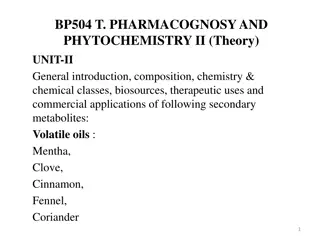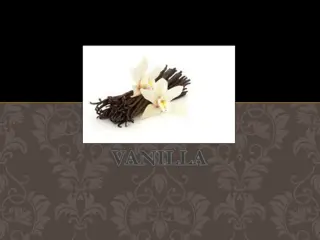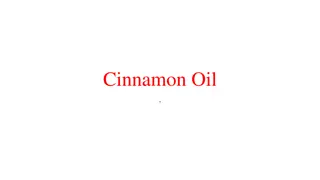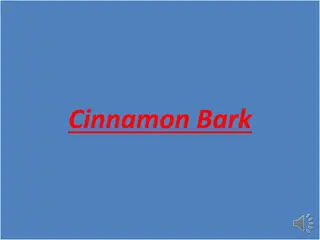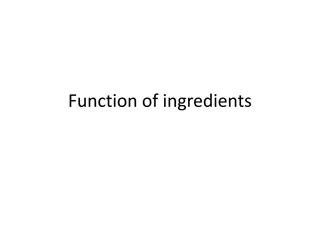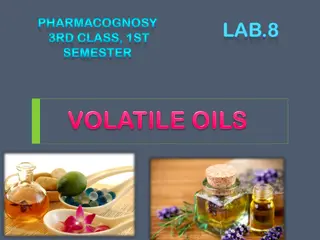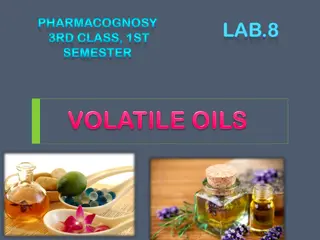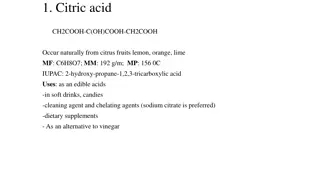Understanding Spirits and Their Uses in Therapeutics and Flavoring
Spirits, also known as essences, are alcoholic or hydro-alcoholic solutions containing volatile substances. They can be classified based on therapeutic or flavoring purposes. These solutions are prepared by distillation or dissolving volatile substances in alcohol, with varying alcohol content. Spir
4 views • 17 slides
Understanding Syrups: Types, Formulations, and Storage Considerations
Syrups are sweet, viscous liquids used in pharmaceutical preparations. They can be non-medicated for flavoring or medicated for therapeutic purposes. There are sugar-based and sugar-free syrups, with sucrose preferred for its purity and handling ease. Preservatives like benzoate and sorbic acid are
4 views • 16 slides
Understanding Spirits: Types and Uses
Spirits are alcoholic or hydro-alcoholic solutions of volatile principles, mainly volatile oils, classified into therapeutic and flavoring types. They are prepared by distillation or dissolving volatile substances in alcohol, with varying alcohol content. Proper storage in light-resistant containers
1 views • 20 slides
Volatile Oils in Pharmacognosy and Phytochemistry: Composition, Chemistry, Uses
Volatile oils, also known as essential oils, are derived from terpenes and their oxygenated compounds. These oils possess characteristic odors and are extracted from plants through various methods like hydro-distillation and steam distillation. They are commonly used as flavoring agents, perfumes, a
0 views • 29 slides
Understanding Methyl Salicylate: Preparation and Uses
Methyl Salicylate, commonly known as oil of wintergreen, is produced through Fischer Esterification by heating salicylic acid with methyl alcohol. It has various applications, from being a rubefacient and analgesic in liniments to a flavoring agent in gums and mints. It is also used in microscopy, f
0 views • 14 slides
Discover the Fascinating World of Vanilla
Uncover the rich history and cultivation process of vanilla, from its ancient origins with the Totonaco Indians to its introduction to the USA by Thomas Jefferson. Learn where vanilla is grown, how it is harvested, and interesting facts about its versatile uses, including odor elimination and culina
0 views • 9 slides
Comprehensive Guide to Cinnamon Oil: Cultivation, Properties, and Uses
Cinnamon oil, extracted from the bark of Cinnamomum trees, is a valuable ingredient known for its aromatic and medicinal properties. This guide covers the cultivation process, macroscopic characteristics, chemical constituents, and uses of cinnamon oil. From its geographical sources to chemical test
0 views • 8 slides
Exploring the Wonders of Cinnamon Bark and Its Uses
Cinnamon bark, derived from Cinnamomum zeylanicum trees, is a revered spice known for its aromatic qualities. The powder showcases light brown or yellowish-brown color with a sweet taste. Microscopically, it contains phloem fibers, sclereids, and parenchyma fragments. This versatile ingredient serve
2 views • 8 slides
Understanding the Properties and Functions of Ingredients in Food Preparation
Explore the various types of ingredients in food preparation, including primary, secondary, components, and composites. Learn about the properties and functions of ingredients such as aerating, binding, browning, emulsifying, flavoring, moistening, preserving, setting, stabilizing, sweetening, thick
0 views • 7 slides
Understanding the Stages of Sugar Cookery in Home Science - TY Sem V
Explore the art of sugar cooking at Shahid Virpatni Lakshmi Mahavidyalaya, Titave, where students learn to cook sugar syrups to different hardness stages for various desserts and confections. The process involves boiling sugar and water to create different types of sugar solutions, understanding the
0 views • 10 slides
Understanding Volatile Oils in Pharmacognosy: Properties, Composition, and Uses
Volatile oils, also known as essential oils, are complex plant products containing volatile principles. They are colorless but may darken over time. Immiscible with water, they have distinct odors and tastes, and are soluble in organic solvents. Officially sourced from plants, volatile oils have the
0 views • 13 slides
Pharmaceutical Ingredients and Excipients in Dosage Form Design
Producing drug substances in their final dosage forms involves various pharmaceutical ingredients like solvents, flavors, colorants, preservatives, and stabilizers. Different dosage forms such as tablets, ointments, creams, and suppositories require specific excipients for formulation. The appearanc
0 views • 29 slides
Understanding Volatile Oils in Pharmacognosy: Properties and Applications
Volatile oils, also known as essential oils, play a crucial role in pharmacognosy due to their complex composition and therapeutic benefits. These oils are immiscible with water but soluble in organic solvents, and their chemical composition includes terpene derivatives and aromatic compounds. They
0 views • 11 slides
Understanding Ghee Residue: Properties, Yield, and Applications
Titled "Understanding Ghee Residue: Properties, Yield, and Applications", the content delves into the by-product of ghee manufacturing known as ghee residue. Highlighting its physico-chemical and functional properties, lipid content, milk sugars, flavoring profiles, antioxidant properties, and fat r
0 views • 12 slides
Common Organic Acids and Their Uses in Various Industries
Citric acid, lactic acid, salicylic acid, and tartaric acid are natural acids found in various fruits. They have diverse applications in food and beverage, pharmaceutical, and cosmetic industries. These acids are used for flavoring, cleaning, as food additives, and in the preparation of various prod
0 views • 4 slides
Artificial Casings Market
artificial sausage casings can offer coloring agents, spices, smoke flavoring, and various other materials as a part of the casing to be deposited on the product surface after stuffing and processing. The variety offered by artificial sausage casings
1 views • 4 slides
